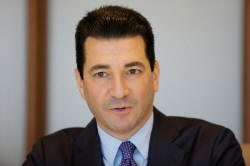|
 FDA
working on a 'dozen' policies to boost copycat biotech
drugs FDA
working on a 'dozen' policies to boost copycat biotech
drugs
 Send a link to a friend
Send a link to a friend
[March 29, 2018] By
Ben Hirschler and Yasmeen Abutaleb
NEW YORK (Reuters) - The U.S. Food & Drug
Administration is working on around a dozen actions to boost use of
cheaper versions of expensive biotech medicines, the head of the agency
Scott Gottlieb said on Wednesday.
|
|
 The United States has lagged behind Europe in use of so-called
biosimilars, to the frustration of FDA policymakers who are starting
to approve such products but who are seeing other impediments to
getting them to consumers. The United States has lagged behind Europe in use of so-called
biosimilars, to the frustration of FDA policymakers who are starting
to approve such products but who are seeing other impediments to
getting them to consumers.
Biological drugs for treating serious conditions such as cancer and
rheumatoid arthritis are complex molecules made inside living cells.
"There's no silver bullet here in terms of trying to make this
market really go gangbusters. I think this is going to be a slow
build," Gottlieb told CNBC's Healthy Returns conference in New York.
"We're going to be coming out with a set of policies, multiple
policies, about a dozen policies that I think incrementally will
each move the ball in a direction trying to create more avenues for
biosimilar competition."
His comments followed a speech earlier this month when he criticized
the health industry for "Kabuki drug-pricing constructs".
One specific action Gottlieb said the FDA was working on was a plan
to make it harder to tweak original branded biological medicines so
that drug makers can extend patents. This should make it easier for
makers of copies, who are able to sell their versions once patents
expire.
Gottlieb also said he was concerned about the impact of deals like
the CVS Health purchase of Aetna Inc on the ability of
pharmaceutical companies to block the entry of cheaper copycat
drugs.

[to top of second column] |

As the pharmacy benefit managers, which administer drug benefits for
employers and health plans and also run large mail-order pharmacies,
and the drug supply chains consolidate, Gottlieb said, they are
making it easier for pharmaceutical companies to block access to
drugs produced by the generic companies that are legally entitled to
create cheaper copycat versions of the medicines.
"We don't have direct purview over it but we do have something to
say about it and we're going to be speaking to the PBMs about it,"
Gottlieb said.
Cigna Corp also agreed recently to buy pharmacy benefit manager
Express Scripts Holding Inc.

PFIZER VS J&J
A key battleground in the biosimilars fight is Remicade, a treatment
for rheumatoid arthritis and Crohn's disease marketed by Johnson &
Johnson.
Pfizer, which sells a cheaper biosimilar version, has sued J&J over
its Remicade contracts with health insurers, arguing that they are
anti-competitive. It contends J&J is offering discounts on Remicade
in exchange for essentially excluding Pfizer's drug from insurance
coverage, keeping it out of the hands of doctors and patients.
J&J says Pfizer's suit is without merit.
(Reporting by Ben Hirschler, Yasmeen Abutaleb and Caroline Humer;
Editing by Frances Kerry)
[© 2018 Thomson Reuters. All rights
reserved.] Copyright 2018 Reuters. All rights reserved. This material may not be published,
broadcast, rewritten or redistributed.
Thompson Reuters is solely responsible for this content. |